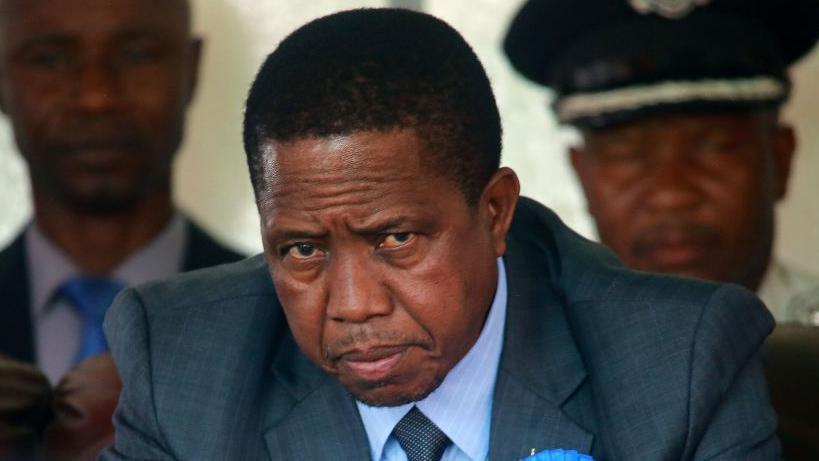I'm facing consequences of returning to politics - Lungu

The former leader is making emphatic return to politics ahead of 2026 elections
- Published
Zambia's former President Edgar Lungu has insisted that he is "virtually under house arrest" although police said the monitoring of his movements was "strictly for his own safety".
"I cannot move out of my house without being accosted and challenged by police, who drive me back home," Mr Lungu told the BBC's Newsday programme.
"I'm facing the consequences of returning to politics and I'm ready for it," he added.
Police have denied claims of planning to ambush the former leader at night.
Mr Lungu announced a comeback to politics last October, prompting the government to withdraw his retirement benefits.
He had retired from politics after losing the presidency to Hakainde Hichilema in 2021.
The former leader has been accusing the government of victimising him and members of his Patriotic Front (PF) party to block his return to politics.
His wife, former First Lady Esther Lungu, has been accused of corruption involving cases of theft of motor vehicles and title deeds, which she denies.
On Friday, Mr Lungu told the BBC that he had been barred from going for medical check-ups and stopped his morning jogging after police told him he could not leave his house.
"Recently, they took me out of a plane where I was supposed to travel for a conference," he added.
Police chief Graphel Musamba on Thursday said it was standard procedure to monitor the movements of the former leader "strictly for his own safety".
"Should Mr Lungu fail to inform us of his movements, we will still ensure his protection by monitoring his activities, as it is our duty to do so," Mr Musamba added.
On Wednesday, Mr Lungu said he had been subject to numerous unconstitutional actions by the state since leaving office.
He said police were under instructions to "ambush me at night, abduct, embarrass, and forcefully detain me like a hardcore criminal".
"As far as I am aware, I have not committed any crime that would warrant the government, through the police, to start scheming against me in this manner," Mr Lungu added.
But State House spokesman Clayson Hamasaka later denied Mr Lungu's claim, saying the former leader was "freely traversing our towns and cities, exercising his rights to free speech and association - freedoms he once denied to others".
"Currently, Mr Edgar Lungu is an active opposition politician in Zambia. The laws of the country clearly define the expectations for an opposition leader," Mr Hamasaka said in a statement.
Attending a church service last Sunday, Mr Lungu warned of a regime change before the next election, saying "a baby can be born before nine months".
Police chief Musamba said Mr Lungu would be summoned to explain his statement, local media reported.
Information Minister Cornelius Mweetwa said the government was "carefully studying" Mr Lungu's remarks, terming them “hair-raising and startling”.
It comes a few days after the police warned that Mr Lungu risked being arrested and prosecuted for "engaging in activities that disrupt public order and safety".
A crowd of people thronged around him as he walked around the streets of Lusaka two weeks ago, ostensibly to assess the reported high cost of doing business in the city.
In February, the former president asked citizens to call for an early election, accusing his successor of failing to manage the economy.
The former leader was last year warned against jogging in public , as police described his weekly workouts as "political activism".
Meanwhile, a human rights body has called on the Zambian government to quash the conviction of an opposition official two weeks ago for apparently defaming the president.
Raphael Nakacinda, a senior PF official, was sentenced on 17 May for his 2021 remarks, alleging that President Hichilema had coerced judges into passing judgments favourable to him.
Human Rights Watch (HRW) said Nakacinda's 18-month prison sentence would have "a broad chilling effect" on the right to freedom of expression in Zambia.
The Zambian government is yet to respond to the HRW statement.
More Zambia stories from the BBC:

Go to BBCAfrica.com, external for more news from the African continent.
Follow us on Twitter @BBCAfrica, external, on Facebook at BBC Africa, external or on Instagram at bbcafrica, external